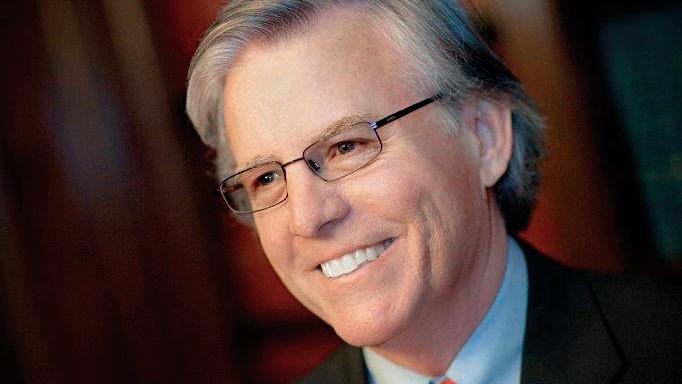In the lawsuit filed by the New York State Common Retirement Fund filed against the Board of Directors of Wynn Resorts Ltd., the complaint paints a nasty picture of Steve Wynn, 76.
It also alleges that the board of directors were aware that their CEO was making unwanted sexual advances and pressuring dozens of employees to perform sex acts with him.
According to the lawsuit, the board’s failure to act was a breach of fiduciary duties to the company and could cost the company its gaming licenses and ruin the company destroying the value of its stock.
The complaint can be read here http://osc.state.ny.us/press/docs/wynn-complaint.pdf
The current board members are named defendants, as well as Wynn and Kimmarie Sinatra, the company’s legal counsel and senior vice president.
According to the complaint:
In 1971, Wynn acquired controlling interest in the Golden Nugget Las Vegas.
According to the Las Vegas Review-Journal, in the days following the publication of the Wall Street Journal article, two women reported to Las Vegas police that they were sexually assaulted by Steve Wynn in the 1970s.
An article in the Nevada Forward describes the account of a cocktail waitress at the Golden Nugget in the 1980s who stated Wynn was forceful and aggressive in his advances, and request that she leave work early and come to his house.
She acquiesced to his demands. She said: “Did I want to have sex with him? No. He signed my checks. I had two little kids, and no child support. He made a habit of going after single moms who were scared and couldn’t afford to lose their jobs.”
Shawn Cardinal, a personal assistant to Elaine Wynn, said that around 1987 Wynn repeatedly asked her to spend time with him outside of work, despite her telling him she had plans with her husband and child.
Cardinal said Wynn would ask her on the phone “what are you wearing? Why don’t you hang out with me after work?”
In 1989, Wynn opened The Mirage, a major casino on the Las Vegas Strip. Wynn changed the name of his company to Mirage Resorts, Inc.
The Las Vegas Review-Journal reports that Wynn allegedly had sex with one of the waitresses – a grandmother – who asked Wynn, “Why don’t you just leave me alone?” Wynn reportedly responded that he had “never had [sex with] a grandmother before” and wanted “to see how it feels.”
The Wall Street Journal reported that, in the early 1990s, Dennis Gomes, an executive at Golden Nugget in Las Vegas when Wynn ran the casino, testified at a deposition that Gomes “routinely received complaints from various department heads regarding Wynn’s chronic sexual harassment of female employees.”
Gomes described a “disgraceful pattern of personal and professional conduct” by Wynn that included him directing Gomes to get home phone numbers of cocktail waitresses. In the Wall Street Journal article, Gomes’s widow said, “I remember him saying, ‘I’m not his [Wynn’s] pimp.’”
In 1997, eleven waitresses at the Wynn-owned Mirage filed suit in Nevada federal district court, alleging a culture of harassment, coerced sexual relations, and misconduct by Wynn.
According to the Las Vegas Review-Journal, the lawsuit contained allegations that waitresses were sent to sexually “accommodate” high rollers at the resort through the 1990s. The suit alleged that Wynn told waitresses they had “fat asses” and did not look good in their uniforms. Waitresses were required to maintain their weight at the time they were hired throughout their employment.
In 1998, Wynn opened the Bellagio, a $1.6 billion resort.
In 2000, Mirage Resorts, Inc. was acquired by MGM Grand Inc. after Wynn lost control of the company amidst stockholder criticism of his spending on art and hotel construction.
Wynn co-founded Wynn Resorts in April 2000 with then wife Elaine Wynn and Japanese billionaire Kazuo Okada. Wynn served as Chairman and CEO. Okada was Vice Chairman of the Board. Wynn Resorts made its initial public offering on the NASDAQ on October 25, 2002, trading under the WYNN ticker symbol.
On April 28, 2005, the Company’s first project, Wynn Las Vegas, opened on the Las Vegas Strip.
Shortly thereafter, according to the Wall Street Journal article, a manicurist who worked there filed a report to the HR department that Wynn forced her to have sex with him. Wynn paid the manicurist a $7.5 million settlement in 2005. In an effort to conceal the 2005 assault, Wynn created a secret limited liability company, Entity Y, in 2005 to make the $7.5 million settlement payment, according to The Wall Street Journal.
Several former Wynn Las Vegas employees recalled that Wynn walked around areas of the Wynn Las Vegas in short shorts without underwear, and that he would get pedicures at the salon and sit in a way that exposed his genitals.
The Wall Street Journal article reports that one former employee said Wynn said to her, “So when are you going to come into my office and f— me?” Once he rubbed his genitals, which were falling out of his shorts, and made comments about things he would like to do with her sexually.
On another occasion, as she was leaving his office, he grabbed her waist as she stood against a wall and told her to kiss him. She slipped out of his hold and left.
The employee’s supervisor and another colleague confirmed being told of these advances at the time but sought to “manage” the situation rather than report it for fear of repercussions.
Wynn Resorts’ second project, Wynn Macau, opened on September 5, 2006, in Macau, China.
In late 2006, Wynn was involved in proceedings before Judge Burton Litvack of the Nevada Labor Relations Board stemming from a labor dispute with his employees. In ruling against Wynn, Judge Litvack wrote that Wynn’s “statements and actions during the meeting [with employees] must be viewed in the context of his desire to frighten and intimidate” them.
The Judge told CNN that he “came out of his chair” listening to Wynn make “very disparaging comments about the women who were at the [employee] meeting, particularly some of them that . . . were crying.”
The Wall Street Journal article reported that one former massage therapist said that several years ago Wynn booked multiple appointments a week with her in the private massage room in his office suite. He continually adjusted a towel to expose himself, and ultimately instructed her to masturbate him to climax. She said she felt she had no choice but to agree to his requests because he was her boss. She said masturbating him became a frequent part of the massage sessions for several months.
In subsequent sessions, Wynn asked her to perform oral sex on him. She refused.
Another masseuse told The Wall Street Journal that Wynn made advances toward her while she massaged him in his office’s private massage room. Wynn would remove his towel and, while she massaged the front of his thighs, would tell her to “go higher,” which she understood to mean touch his genitals. After she told him this made her uncomfortable, his requests for her massages became less frequent.
Former employees told The Wall Street Journal they sometimes entered fake appointments in the books to help other women workers get around a request for services in Wynn’s office or arranged for others to pose as assistants so they would not be alone with him.
Former employees told of female employees hiding in the bathroom or back rooms when they heard he was on the way to the salon.
“Everybody was petrified,” said Jorgen Nielsen, a former artistic director at the salon. Nielsen said he and others repeatedly told company executives Wynn’s sexual advances were causing a problem, but “nobody was there to help us.”
In January 2010, Wynn and his wife of 46 years, Elaine Wynn, divorced. Pursuant to the divorce agreement, Elaine, who was a co-founder of the Company and was, at the time, a Board member, received approximately 9% of the Company stock from Steve Wynn.
Court filings by Elaine Wynn claim that despite the fact that Senior VP Sinatra knew of the allegations since 2009, Sinatra set a “tone at the top” that “discouraged any challenge to Steve Wynn.”
The board repeatedly allowed Wynn to stand for re-election without advising stockholders of the workplace environment created by Wynn, because the company viewed his leadership as critical to its success, the lawsuit alleges.
As a result of Elaine Wynn’s receipt of approximately 9% of Company stock from Wynn, his partner, Kazuo Okada, became the largest stockholder, owning approximately 20% of company stock. In litigation commenced in 2012, Okada claims that Wynn crafted a plan to oust him from the board and force the company to buy his shares pursuant to the unsuitability provisions of the company’s articles that permits the board to force the sale of stock to the company of major stockholders if their behavior warrants it.
The company commenced an investigation into Okada’s alleged bribing of Philippine government authorities. All of Wynn Resorts’ Board members voted to remove Okada from the board and redeem his shares. The resulting lawsuit, styled Wynn Resorts, Ltd. v. Okada et al. is ongoing.
As part of the power struggle stemming from the Wynns’ divorce, in 2012, Elaine Wynn filed a counterclaim against Wynn in the Okada action. She challenged Wynn by asking governance related questions, including the appropriateness of the $7.5 million settlement payment to the alleged sexual assault victim that Wynn allegedly assaulted on company property.
In 2015, the board chose not to re-nominate Elaine Wynn to the board despite the fact that Elaine Wynn co-founded Wynn Resorts and was its third-largest shareholder. Elaine Wynn launched a proxy fight in an effort to have stockholders vote her into an open seat, but lost that fight on April 24, 2015.
On March 28, 2016, Elaine Wynn amended her counterclaim in the Okada action to allege, among other things, that Wynn “engaged in alleged misconduct on Company property against at least one Company employee serious enough to warrant a multimillion dollar payment[,]” that he “had used Company resources to conceal the allegations[,]” and that he exercises complete control over the Board and retaliates against anyone who crosses him.”
The Board issued a press release on March 28, 2016, the same day Elaine Wynn filed her counterclaim, dismissing the allegations, stating that “Elaine Wynn’s latest claims are consistent with the falsehoods and distortions she previously made against the Company and its CEO Steve Wynn” and that “Ms. Wynn’s latest allegations regarding our Board, its composition and its independence are simply not true and are rehashed from her previous, unfounded statements made during her proxy campaign.”
The Board further stated “[a]s a leader in a highly regulated industry, Wynn Resorts prides itself on transparency and full disclosure to regulators and shareholders. Allegations made by Ms. Wynn that the company would hide any relevant activities from our regulators are patently false.”
In a recent filing with the SEC, citing possible risks to Wynn Resorts, the company said, “If we lose the services of Mr. Wynn, or he is unable to devote sufficient attention to our operation for any reason, our business may be significantly impaired.”
In 2016, Steve Wynn received more than $28 million in compensation from Wynn Resorts. Over the past five years, his compensation totaled over $111 million.
On January 26, 2018, The Wall Street Journal published a detailed account of Wynn’s alleged sexual predation of employees.
Immediately following the Wall Street Journal article, Wynn resigned from his position as Finance Chairman to the Republican National Committee.
On January 31, 2018, the University of Pennsylvania announced it was revoking the honorary degree it had bestowed on Wynn stating, “The nature, severity, and extent of these allegations [against Wynn], and the patterns of abusive behavior they describe, involve acts and conduct that are inimical to the core values of our University.”
The University also announced it will remove “Wynn Commons” from an outdoor plaza on the campus and remove Wynn’s name from a scholarship fund he created.
On February 6, 2018, citing an “avalanche of negative publicity” Wynn resigned as Chairman and CEO of Wynn Resorts.
The Board issued a statement announcing Wynn’s resignation and explained it accepted Wynn’s resignation with a “collective heavy heart” calling Wynn “our founder, CEO, and friend” as well as “industry giant, philanthropist and beloved leader and visionary.”
The board accepted his resignation “with a collective heavy heart,” calling Wynn a “friend” and a “beloved leader and visionary.”
In the wake of the Wall Street Journal article, the Nevada Gaming Control Board received numerous reports about Wynn, and the volume of calls it received prompted it to introduce a new online system for the public to send in confidential complaints and tips.
Wynn’s alleged sexual abuse and harassment has led to investigations by gaming regulators in Massachusetts, Nevada and Macau.
***
A JPMorgan Chase analysis of Wynn Resorts noted that the company has “the single largest individual CEO dependency” of any gambling company JPMorgan Chase has analyzed.
In 2015, Institutional Shareholder Services, Inc., a proxy advisory firm, recommended that stockholders withhold support from the two directors nominated for re-election, citing an “overall corporate governance profile that ranks among the worst, not the best, of U.S. companies” and stated that the Company suffered from “manifest failures of governance,” criticized Wynn Resorts’ executive compensation structure, questioned Steve Wynn’s excessive aircraft use, and questioned the atypical secrecy of the Board.
In 2017, Institutional Shareholder Services, Inc., a proxy advisory firm, gave Wynn Resorts its worst ranking for governance risk.
Glass Lewis & Co., the second-biggest proxy advisory firm, gave Wynn Resorts poor marks on governance, grading its pay-for-performance practices an “F” the past two years.
There is no indication as yet that the stock of Wynn Resorts has been impacted by media reports.
Here is 10 years of stock prices for Wynn Resorts in early March:
3/03/2008 100.2
3/04/2009 17.63
3/04/2010 66.57
3/04/2011 130.53
3/05/2012 126.55
3/04/2013 116.15
3/06/2014 248.99
3/04/2015 138.69
3/04/2016 88.37
3/03/2017 100.02
3/02/2018 161.78
2017 stock prices began at about $100 per share and ended at about $160 – where the stock is now.
4/04/2017 116
9/05/2017 142.58
12/04/2017 159.965
The scandal broke on Jan. 26, 2018.
Stock prices about a month after the scandal are at about the levels it was at a month prior to the scandal:
1/02/2018 165.11
1/16/2018 170.6
1/24/2018 196.88
1/26/2018 201.99
Wall Street Journal report.
1/29/2018 171.03
1/30/2018 160.89
1/31/2018 173.27
2/02/2018 167.95
2/06/2018 163.5
Wynn resignation
2/08/2018 178.2
2/12/2018 167.62
2/20/2018 163.88
2/26/2018 168.07
3/02/2018 161.78
***
The following is the list of Board of Directors of Wynn Resorts, followed by their state of residency, the year they began on the board, their compensation in 2016, and shares of Wynn stock they owned as of March 2017:
Alvin V. Shoemaker/ Idaho/2002/ $384,473/ 38,637 shares.
Robert J. Miller/Nevada/ 2002/ $517,973/38,637
Boone Wayson/Maryland/2003/$384,473/123,637
Dr. Ray R. Irani/ California/ 2007, $362,406/91,137
John J. Hagenbuch/ Idaho/ 2012/ $400,973/ 27,535 .
Edward Virtue/Florida/2012/$384,473/21,385
Patricia Mulroy/Nevada/2015/$372,302/12,559
Clark T. Randt, Jr./Utah/2015/$327,302/12,559
Jay L. Johnson/Idaho/2016/$380,935/10,000




















